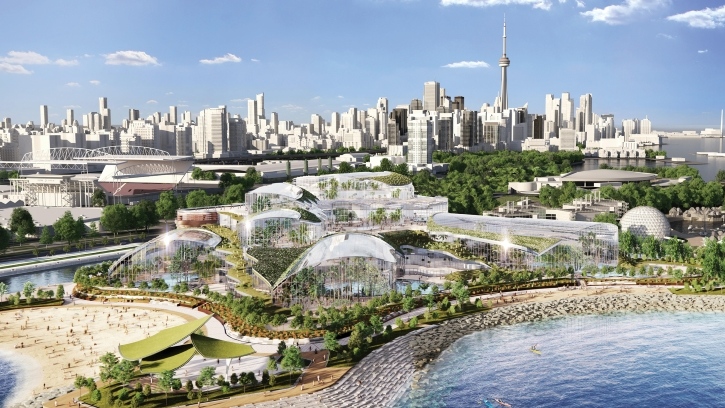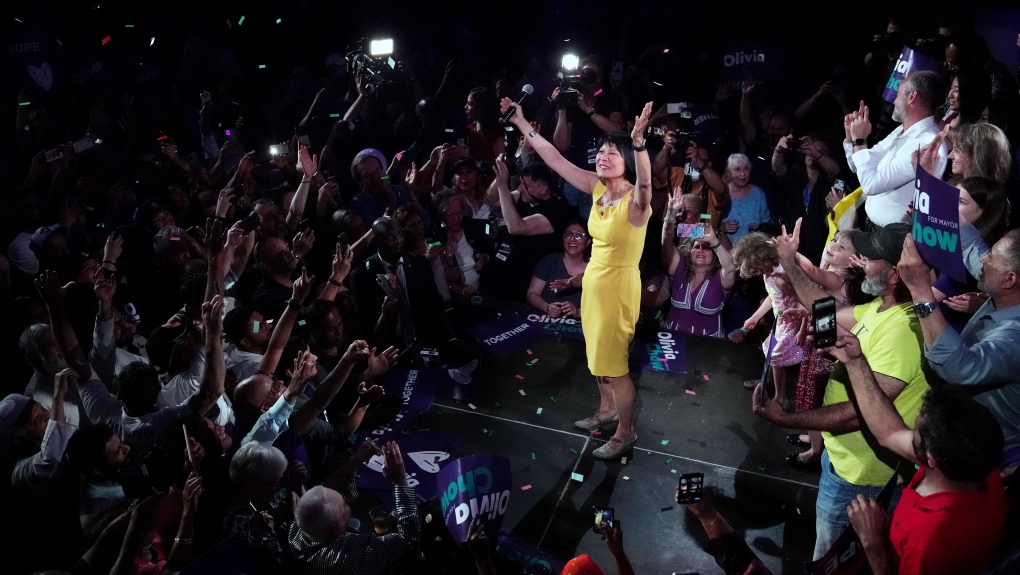Olivia Chow will be Toronto’s next mayor. Here's what she promised
Former city councillor and member of parliament Olivia Chow has been elected mayor of Toronto.
Chow was declared the winner of the mayoral byelection on Monday night after dominating in the polls.
The next city council meeting is scheduled for July 19. Here’s what Chow promised to do during the election campaign:
TRANSIT
Chow has promised to build a dedicated busway to replace the decommissioned Scarborough RT to the tune of about $60 million. She said the funding would come from replacing the Gardiner Expressway with an at-grade boulevard between Cherry Street and the Don Valley Parkway rather than rebuilding the roadway.
More widely, she has committed to “reversing the recent service cuts” made to the TTC, ensure cell service is available to riders, and make sure public transit is “fast and reliable.”
HOUSING
One of the biggest differences between Chow and the other candidates was her pledge to raise Toronto’s vacant home tax from one per cent to three per cent. The money collected would be used for affordable housing initiatives.
Chow has also promised to build 25,000 homes on city-owned land in the next eight years. Those homes would be developed by the city as well, with a minimum of 7,500 affordable units and at least 2,500 units to be rent-geared-to-income.
About $5 million would be used to create new 24/7 respite spaces and another $5 million to expand street outreach and drop-in programming. Chow has pledged to spend another $14.6 million on rent supplements for about 1,000 individuals experiencing homelessness to find stable housing.
ONTARIO PLACE
The province’s plans to redevelop Ontario Place along Toronto’s waterfront, as well as the related move of the Ontario Science Centre, was a key campaign issue for the city’s mayoral candidates.

Chow has promised to fight the province over its plans to construct a large spa on a portion of the land in favour of a larger public park. In order to do so, she has said she would withhold a smaller parcel of city-owned land to prevent the Ontario government from moving forward with their plans.
TAXES
The municipal land transfer tax will increase leadership on homes sold for more than $3 million. The money collected from this tax increase will be used to support people experiencing homelessness.
Property tax in Toronto will increase by a “modest” amount, Chow has said, although she has not provided an exact number. She has, however, said the increase will not be near 25 per cent as suggested by other candidates. This increase will support city improvements, including reducing wait times on 911 calls.
ROADS
Chow’s plans for Toronto roadways centres on bringing people back to transit and improving cycling infrastructure—however, very few details have been released on how she will invest in items such as bike lanes.
CAFÉTO
A large part of Chow’s plan involves making Toronto’s streets “more fun places to be all summer.”
She has said she will improve upon Toronto’s CafeTO program to ensure businesses and BIA’s get prompt information so they can plan ahead and hire staff. She has also pledged to provide financial supports for some businesses to participate and establish a team to execute the program, including expediting applications for businesses that applied a year earlier.

LIBRARIES
Chow has pledged to expand weekday library hours, ensuring Toronto Public Library branches are open seven days a week, including Sundays.
STRONG MAYOR POWERS
Chow has promised not to use the strong mayor powers handed to municipal leaders by the Ontario government. The powers allow the mayor to overrule a council decision based on provincial priorities such as housing and housing infrastructure, as well as present a budget and hire certain staff.
Chow, however, has said she supports majority rule at city hall. She has promised never to veto council decisions.
With files from CP24’s Joshua Freeman
CTVNews.ca Top Stories

opinion Tom Mulcair: Prime Minister Justin Trudeau's train wreck of a final act
In his latest column for CTVNews.ca, former NDP leader and political analyst Tom Mulcair puts a spotlight on the 'spectacular failure' of Prime Minister Justin Trudeau's final act on the political stage.
B.C. mayor gets calls from across Canada about 'crazy' plan to recruit doctors
A British Columbia community's "out-of-the-box" plan to ease its family doctor shortage by hiring physicians as city employees is sparking interest from across Canada, says Colwood Mayor Doug Kobayashi.
'There’s no support': Domestic abuse survivor shares difficulties leaving her relationship
An Edmonton woman who tried to flee an abusive relationship ended up back where she started in part due to a lack of shelter space.
opinion King Charles' Christmas: Who's in and who's out this year?
Christmas 2024 is set to be a Christmas like no other for the Royal Family, says royal commentator Afua Hagan. King Charles III has initiated the most important and significant transformation of royal Christmas celebrations in decades.
Baseball Hall of Famer Rickey Henderson dead at 65, reports say
Rickey Henderson, a Baseball Hall of Famer and Major League Baseball’s all-time stolen bases leader, is dead at 65, according to multiple reports.
Arizona third-grader saves choking friend
An Arizona third-grader is being recognized by his local fire department after saving a friend from choking.
Germans mourn the 5 killed and 200 injured in the apparent attack on a Christmas market
Germans on Saturday mourned the victims of an apparent attack in which authorities say a doctor drove into a busy outdoor Christmas market, killing five people, injuring 200 others and shaking the public’s sense of security at what would otherwise be a time of joy.
Blake Lively accuses 'It Ends With Us' director Justin Baldoni of harassment and smear campaign
Blake Lively has accused her 'It Ends With Us' director and co-star Justin Baldoni of sexual harassment on the set of the movie and a subsequent effort to “destroy' her reputation in a legal complaint.
Oysters distributed in B.C., Alberta, Ontario recalled for norovirus contamination
The Canadian Food Inspection Agency has issued a recall due to possible norovirus contamination of certain oysters distributed in British Columbia, Alberta and Ontario.


































